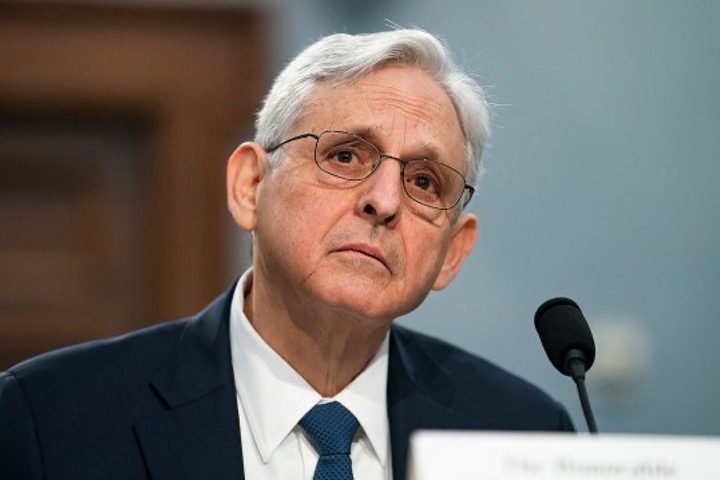
Fearing that the American people might find out just how far President Joe Biden’s dementia has advanced, the White House and Department of Justice have asserted executive privilege to withhold the audio recordings of special counsel Robert Hur’s damning interview with him.
The committee subpoenaed the recordings on February 27, but the White House refused to comply.
Faced with a possible contempt citation, in letters to U.S. House Judiciary Chairman Jim Jordan (R-Ohio) and House Oversight Committee Chairman James Comer (R-Ky.), Biden counsel Edward Siskel and Assistant Attorney General Carlos Uriarte delivered the news. The transcript was bad enough, they said in so many words. You won’t hear Biden’s failing memory in his own voice.
So now the House has held Attorney General Merrick Garland — who advised Biden to assert the privilege — in contempt of Congress.
Letters
“While our cooperation with Congress has been extraordinary, we also have a responsibility to safeguard the confidentiality of law enforcement files where disclosure would jeopardize future investigations,” Uriarte wrote today. “The Attorney General must draw a line that safeguards the Department from improper political influence and protects our principles, our law enforcement work, and the people who carry out that work independently.”
Uriarte also wrote that the Justice Department has done what it needed to do to fulfill the committees’ request:
The Department’s record in this matter is clear. We have made substantial efforts to accommodate your interest in Special Counsel Hur’s investigation. …
Despite our repeated requests over several months, the Committees have still not identified a remaining need for these audio files that would serve the asserted purposes of your investigations.
We have repeatedly made clear that disclosure of the subpoenaed audio recordings would damage future law enforcement efforts and that the Committee’s continued demands raise serious separation of powers concerns.
Uriarte then pointed to Garland’s letter to Biden. It said, “The Department has long recognized that executive privilege protects materials related to a closed criminal investigation where disclosure is likely to damage future law enforcement efforts.”
Garland also told Biden that “the Committees’ needs are plainly insufficient to outweigh the deleterious effects that production of the recordings would have on the integrity and effectiveness of similar law enforcement investigations in the future.”
Siskel’s letter said much the same thing, and burbled about the “rule of law,” noting that the committee wants the tape for political reasons.
Wrote Siskel, “The President has a duty to safeguard the integrity and independence of Executive Branch law enforcement functions and protect them from undue partisan interference that could weaken those functions in the future.”
“The absence of a legitimate need for the audio recordings lays bare your likely goal — to chop them up, distort them, and use them for partisan political purposes,” he continued:
Demanding such sensitive and constitutionally-protected law enforcement materials from the Executive Branch because you want to manipulate them for potential political gain is inappropriate.
Contempt of Congress
Thus did Jordan’s Judiciary Committee hold Garland in contempt. A vote by the Oversight Committee was delayed so members could attend Manhattan District Attorney Alvin Bragg’s show trial of Donald Trump.
“A last-minute move from President Biden to claim executive privilege over audio recordings from his interview with special counsel Robert Hur did not dissuade the GOP from proceeding, even as Garland said those asserting the privilege ‘cannot be prosecuted for criminal contempt of Congress,’” The Hill reported.
“Transcripts do not capture demeanor evidence,” Rep. Dan Bishop (R-N.C.) said, the website reported. “Transcripts are often imperfect, especially to convey the timing of question and answer and disfluencies of a witness, or hesitations, among other things. All of that is demeanor evidence.”
The Hur Interview
That demeanor is what Garland and the White House are trying to hide. When the transcripts were released, they showed just how shocking Biden’s cognitive decline has become.
For instance, Biden didn’t know when his son Beau died of brain cancer. A White House lawyer had to remind Biden that he died in 2015.
As well, Hur’s report said, “He did not remember when he was vice president, forgetting on the first day of the interview when his term ended (‘if it was 2013 — when did I stop being Vice President?’), and forgetting on the second day of the interview when his term began (‘in 2009, am I still Vice President?’).”
That memory lapse is one reason Hur decided not to prosecute Biden for “willfully” mishandling classified documents, the subject of the probe.
“At trial, Mr. Biden would likely present himself to a jury, as he did during our interview of him, as a sympathetic, well-meaning, elderly man with a poor memory,” the report said:
Based on our direct interactions with and observations of him, he is someone for whom many jurors will want to identify reasonable doubt.
It would be difficult to convince a jury that they should convict him — by then a former president well into his eighties — of a serious felony that requires a mental state of willfulness.
In testimony before the Judiciary Committee, Hur said that the White House pressured him to change the report’s conclusion that Biden’s memory had failed him once again.
In other words, the report, as well as Biden’s inappropriate rage about it, adds to the mounting evidence that Biden has dementia.
The audio recording that Republicans seek would confirm this with Biden’s voice.
H/T: , Politico, CBS News, Ace of Spades



